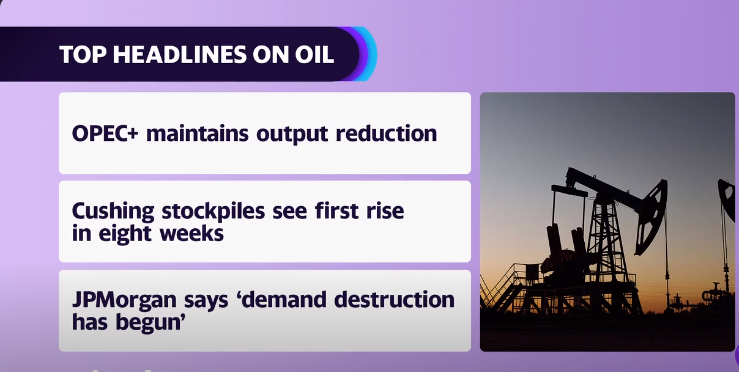Amidst the ongoing clash between Israel and Hamas, one might naturally anticipate a surge in oil prices, given the substantial oil reserves in this region. However, the unexpected is occurring—oil prices are on a downward trend. This prompts the question: Why?
 |
| OPEC+ is holding steady on its strategy to reduce oil production |
Limited Supply Disruption
Despite the intensity of the conflict, there's been minimal disruption to petroleum supplies. Analysts posit that the main reason for the current stability in oil prices is the absence of an immediate threat to oil production. Traders exercise caution, refraining from hurried precautionary purchases.
Richard Bronze, the head of geopolitics at Energy Aspects, stresses that the market seems to be downplaying the potential for significant disruptions in the Middle East. Raad Alkadiri, managing director for energy and climate at Eurasia Group, adds that traders are unlikely to react strongly unless they observe the actual removal of barrels from the market.
Focus on Waning Demand
The energy market has shifted its focus away from the ongoing conflict, directing attention to a pessimistic outlook on future petroleum demand. Economic concerns, especially regarding China, the largest oil importer, and other major consumers, dominate the narrative. Producers like Saudi Arabia aim to support prices by curbing oil output.
Forecasters are painting a challenging picture for oil markets in 2024. The U.S. Energy Information Administration predicts a decline in gasoline consumption in the United States due to more efficient vehicle engines, the rise of electric cars, and reduced commuting as hybrid work schedules become more prevalent.
Robust U.S. Oil Production
In the midst of geopolitical turmoil, robust oil production in the United States acts as a reassuring factor for the markets. The world's largest oil producer recently achieved a monthly production record, counterbalancing concerns arising from the Middle East conflict. Jim Burkhard, vice president and head of research for oil markets at S&P Global Commodity Insights, asserts that strong oil market fundamentals currently outweigh fears.
Haves and Have-Nots in the Middle East
Traders are discerning between oil-rich and oil-poor regions in the Middle East. Gaza and Israel contribute minimally to the global oil supply, and for a significant disruption to occur, the conflict's effects would need to reach major oil-producing countries like Saudi Arabia, Iraq, or Iran.
While early in the conflict, Iran proposed an oil embargo against Israel, the contemporary geopolitical landscape, climate change concerns, and oil revenue dependence make such a move unlikely. An oil embargo could risk alienating key customers, particularly China.
Remaining Risks
Although a significant disruption is currently unlikely, history has shown that unexpected events can impact oil markets. A missile attack on a key Saudi facility four years ago, attributed to Iran, temporarily halted about half of the kingdom's oil production.
In an extreme scenario, Iran, a key supporter of Hamas, could attempt to block the Strait of Hormuz, a critical passage for oil transportation. Helima Croft, head of commodities at RBC Capital Markets, suggests that the apparent market complacency could stem from traders' previous losses when prices surged above $120 a barrel, only to quickly fall.
Despite the current calm, the Biden administration is working to prevent an escalation of the conflict. The focus of regional oil powers is to maintain the flow of tanker traffic through the Persian Gulf, crucial for their export earnings. The risks, as highlighted by Richard Bronze of Energy Aspects, lie more in miscalculation and misjudgment than in a broader impact on major oil producers or shipping lanes.
In conclusion, while oil prices are currently weathering the storm of the Israel-Hamas conflict, the situation remains dynamic, and the market's attention span for such issues may lead to unexpected surprises. The resilience of oil prices amidst geopolitical turmoil reflects a complex interplay of supply and demand dynamics, geopolitical considerations, and the market's historical responses to similar events.
F.A.Q.
Question 1.
Q.: Why are oil prices falling during the Israel-Hamas conflict?
A.: Despite the intense conflict in the Middle East, oil prices are experiencing a downturn due to limited disruption to petroleum supplies. Analysts highlight that the fighting, while severe, has not significantly impacted oil production, leading traders to perceive no immediate threat.
Question 2.
Q.: What is the main reason for oil prices not being higher during the conflict?
A.: Analysts, including Richard Bronze from Energy Aspects, emphasize that the primary reason for relatively stable oil prices is the minimal disruption to petroleum supplies. Traders are exercising caution, refraining from precautionary buying, as the market seems to dismiss the possibility of significant disruptions in the Middle East.
Question 3.
Q.: How is the conflict in the Middle East affecting the energy markets?
A.: The ongoing conflict in the Middle East has led to a slump in energy markets. Despite the intense fighting, traders are cautious, and the market appears to be focusing more on subdued demand forecasts than the immediate impact of the conflict on oil prices.
Question 4.
Q.: Why is the market seemingly complacent about the potential impact of the conflict on oil prices?
A.: Traders are adopting a cautious approach, with market sentiment leaning towards complacency. Raad Alkadiri, managing director for energy and climate at Eurasia Group, suggests that traders are unlikely to bid up prices unless they witness actual removal of barrels from the market.
Question 5.
Q.: What are the key factors influencing oil prices amidst the conflict?
A.: The factors influencing oil prices amidst the conflict include limited disruption to petroleum supplies, a focus on subdued demand forecasts, and a return to pessimism about future demand for petroleum. Economic concerns about major consumers like China, coupled with efforts by producers to support prices by reducing oil output, contribute to the current dynamics in the oil markets.
Comments
Post a Comment